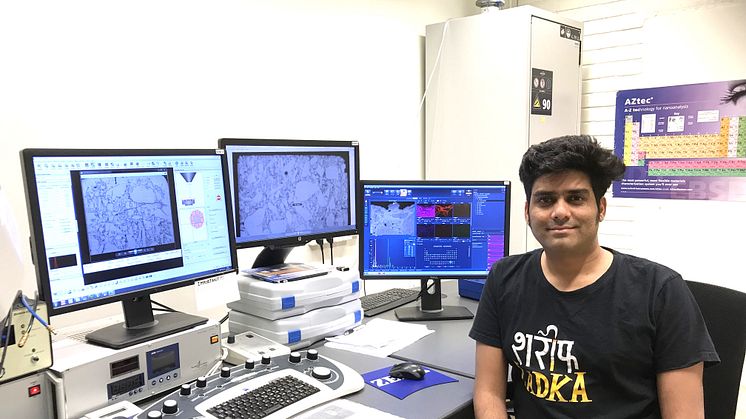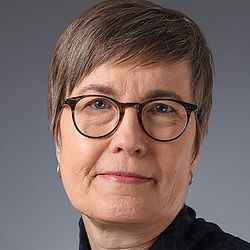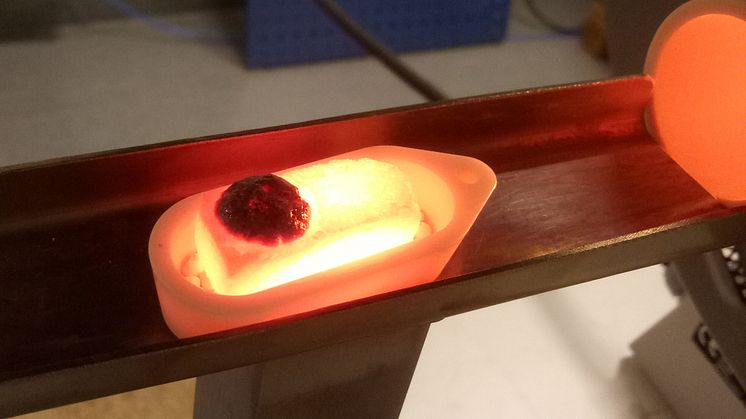
Press release -
Increased understanding of corrosion in lime kilns fired with biofuel
To reduce carbon dioxide emissions from lime kilns, there is a growing interest in introducing bio-based fuels as an alternative to fossil fuels. Naresh Kumar Wagri, Department of Applied Physics and Electronics, Umeå University, shows in his thesis that this presents challenges due to the different chemical and physical properties of biofuels.
"The infiltration of ash slag that settles in the protective inner walls of the furnace is more extensive from biomass fuel than from coal fuel due to the different chemistry of the fuels” he explains.
In industrial furnaces, boilers and incinerators where high temperature processes take place, an internal shell is needed to protect against the high temperatures and chemical attack. These linings are usually made from bricks of ceramic materials that can withstand the high temperatures. Typical industries where these refractory liners are used are in metallurgy, quicklime production, cement production, glass production and the petroleum and energy sectors.
One problem is that the high temperatures and chemical interactions in some industrial processes cause the refractory materials to degrade. If molten fuel ash enters the refractories through pores and small cracks, corrosion can occur. When the refractory materials wear out, the lining has to be replaced, causing the whole process to be shut down for several days. These stoppages result in production losses and expensive maintenance, including new lining materials.
Limestone is burned to lime in lime kilns at temperatures above 1000°C. Naresh Kumar Wagri has in his thesis work investigated how the conversion to biofuels in lime production kilns affects the lining material. The overall goal of the research is to develop knowledge about what happens to refractory materials in lime kilns when fossil fuels are replaced by renewable fuels.
Biomass fuels can come from bio-based waste streams from industries or be grown specifically for combustion. However, the ash content and properties of bio-based fuels tend to be problematic from an ash chemistry perspective. Therefore, before introducing a new fuel source, it is important to investigate its potential effects on the furnace lining material.
Kumar Wagri's results show that infiltration of ash slag into the lining material changes the microstructure of refractory materials, causing degradation. The problem is more widespread than when using coal fuel because of the different chemistry of the fuels.
“The next step could be extended to other types of biomass fuels and other qualities of refractories” he says.
About the thesis defence
On Thursday 14 December 2023, Naresh Kumar Wagri, Department of Applied Physics and Electronics, Umeå University, will defend his thesis entitled Assessment of Bio-Based Fuel Ash Effects on Magnesia Refractory Materials in Quicklime Production Kilns. The defence will take place at 13:00 in lecture hall NAT.D.480, at Umeå University. Opponent is Dr Bengt-Johan Skrifvars, Åbo Akademi University, Finland.
For more information, please contact:
Naresh Kumar Wagri, doctoral student, Department of Applied Physics and Electronics, Umeå University
Phone: +46 764496678
Email: naresh.kumar@umu.se
Topics
Categories
Umeå University
Umeå University is one of Sweden’s largest institutions of higher education with over 37,000 students and 4,300 faculty and staff. The university is home to a wide range of high-quality education programmes and world-class research in a number of fields. Umeå University was also where the revolutionary gene-editing tool CRISPR-Cas9 was discovered that has been awarded the Nobel Prize in Chemistry.
At Umeå University, distances are short. The university's unified campus encourages academic meetings, an exchange of ideas and interdisciplinary co-operation, and promotes a dynamic and open culture in which students and staff rejoice in the success of others.



